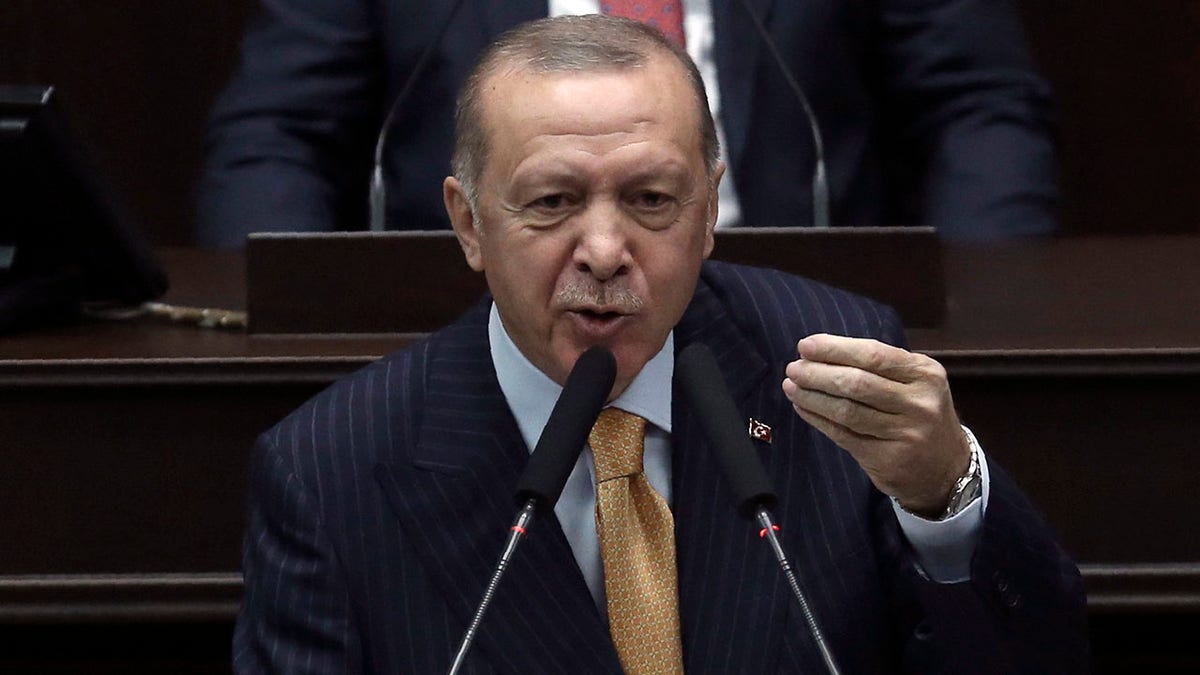Fox News Flash top headlines for December 14
Fox News Flash top headlines are here. Check out what's clicking on Foxnews.com.
The State Department announced Monday that the U.S. is imposing sanctions on Turkey over its acquisition of Russian S-400 air missile defense system, which could further strain relations with the longtime NATO ally as President-elect Joe Biden prepares to take office, analysts say.
A defense spending bill approved by Congress includes language to mandate the sanctions, though President Trump has maintained his threat to veto the bill because it includes a requirement to rename bases named after Confederate figures, and it “fails to make any meaningful changes” to the section 230 of Communications Decency Act, which provides legal protections to Big Tech companies.
The Senate passed the National Defense Authorization Act (NDAA) Friday in an 84-13 vote, syncing up with the House approving the final version of the bill. Trump has 10 days to sign the bill into law or veto it after the White House receives it, but the bill has already received enough support from both chambers of Congress to override a possible veto.
Whether Trump vetoes the bill or not, analysts predict that the Turkish government will seek to get off to a good start with the incoming Biden administration.
“Erdogan will become whatever Biden wishes him to be — at least in the short term,” said Soner Cagaptay, director of the Turkish Research Program at the Washington Institute.
ISIS SLEEPER CELL ATTACKS IN SYRIA REACH RECORD LOW, DATA SHOWS
Ali Cinar, a foreign policy expert and 2019 Ellis Island Medal of Honor recipient, said a defense partnership with the U.S. is out of the question as long as Turkey’s S-400 purchase from Russia remains an unresolved issue.
“There were crises that were not as evident because of President Trump’s relationship with President Erdogan,” he said. “Biden’s priority will not be Turkey.”
The 2017 Countering America’s Adversaries through Sanctions Act (CAATSA) directs the president of the United States to impose five or more specific sanctions on those who engage in significant transactions with the defense or intelligence sectors of the Russian government.
The CAATSA sanctions were first raised when Turkey signed a contract with Russia to purchase and activate the S-400 air missile defense systems in 2017. Turkey’s deal also received the ire of other allies due it the system’s incompatibility with NATO.
U.S. Dept. of Defense officials are concerned that the S-400 could become the tool that could be used to steal the technology of the F-35 fighter jets by the Russians. Despite the threat from the U.S. to remove the country from the F-35 Lightning II Joint Strike Fighter program, Turkey proceeded with the purchase of the Russian missile defense systems.
Turkish President Recep Tayyip Erdogan has blamed the Obama administration for not allowing the country to acquire the U.S.-manufactured Patriot surface-to-air missile defense systems.
IRANIAN PRESIDENT DIRECTLY ACCUSES ISRAEL OF KILLING NUCLEAR SCIENTIST
Erdogan said Friday that U.S. sanctions over Turkey's purchase of Russian defense systems would be “disrespectful” to an important ally in NATO, state-owned Anadolu news agency reported.

Turkey's President Recep Tayyip Erdogan addresses his ruling party lawmakers at the parliament, in Ankara, Turkey, Wednesday, Oct. 28, 2020. (AP Photo)
“We have long-standing political and economic relations with the U.S. and the E.U. which neither party can ever ignore or risk to lose,” Erdogan said in a video conference to his party’s provincial heads. “Sanction agendas, imposed with political motivations and without any rational basis, constitute an approach that is harmful to all parties and beneficial to no one.”
Turkish Presidential spokesman Ibrahim Kalin had called the move “counter-productive” Wednesday, prior to the Senate vote on NDAA.
Biden received backlash from the Turkish government when a video interview with New York Times surfaced where Biden called the Turkish president “an autocrat,” during the presidential election campaign. “What I think we should be doing is taking a very different approach to him now, making it clear that we support opposition leadership,” he said.
Speaking at a news conference on Wednesday, Erdogan said he would talk to Biden once he takes office next month.
Biden has criticized the Trump administration’s policy in Syria, which paved the way for Turkey to create a buffer zone in the northern part of the country while replacing the Kurdish YPG who fought against ISIS with U.S. forces. He condemned Trump’s withdrawal of U.S. troops from northern Syria, calling it a betrayal of the Kurds and “the most shameful thing any president has done in modern history in terms of foreign policy.”
Biden also said Turkey “must pay a heavy price” for its military campaign in Syrian Kurdish territory. He stated in his interview with the New York Times in January that he is “very concerned” about the U.S. keeping nuclear weapons in Turkey. Turkish governments view the YPG militia as a sub-branch of Kurdistan Workers' Party (PKK), a terrorist group designated by the U.S. government.
Turkey, emboldened after its military moves in Syria and its involvement in the civil war in Libya, has been challenging the maritime borders in the eastern Mediterranean Sea with Greece for its gas exploration. The European Union is also set to respond with sanctions on the country.
CLICK HERE TO GET THE FOX NEWS APP
One expert said the tougher U.S. approach to Turkey is long overdue.
“It’s now been 18 months since Erdogan took delivery of the S-400. And it’s time for the United States to stop getting kicked around," said Tom Karako, a senior fellow at the Center for Strategic and International Studies.


